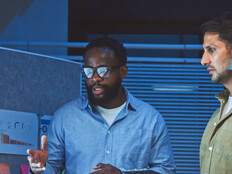Steve Wozniak Looks Forward to the Possibilities with Fusion-io
As one of the most easily recognized people in the technology world, Apple co-founder Steve Wozniak might seem to have nothing left to prove in his career. But when presented with the opportunity to become Fusion-io’s chief scientist, “Woz” saw a chance to follow a new path in his journey and work with an innovative company on a fascinating technology.
BizTech Editor in Chief Ryan Petersen corresponded with Wozniak about his role at Fusion-io, the future of solid-state storage and advice for someone starting a technology company.
BizTech: What first piqued your interest in working with Fusion-io?
Wozniak: When I meet someone with an interesting technology or idea, I always ask a lot of detailed questions. Usually the questions don’t get answered to my satisfaction, or the innovation wasn’t as interesting as I thought it was initially.
When I first met David Flynn [president and CTO of Fusion-io], I quickly realized what a visionary he was. To each of my questions about Fusion’s technology, he had an answer that not only was satisfactory but opened up a new set of possibilities that were even more fascinating to consider. One example: how this technology will eventually make possible large-scale facial and audio data recognition so that you can search through entire film archives online for people with Clark Gable’s facial features or for a line of dialogue from The Big Sleep. It’s an amazing tool that will enable that kind of interaction with media.
Or just consider how this technology, which has in some cases led to a 10-to-1 server reduction, will help reduce data center emissions. That’s something that can be implemented by your customers tomorrow. But the possibilities of a technology like this are really only limited by the imagination of the developers. Once I fully understood what Fusion-io is doing, I wanted to be more involved; and David and Rick White, David’s business partner starting Fusion-io, eventually offered me the position [of chief scientist] over a couple of lunches we had together.
BizTech: What do you think are the biggest advantages of solid-state storage for businesses?
Wozniak: The technology is inspired by memory controllers like the ones in DRAM [dynamic random access memory] that allow direct memory access to the storage media without storage controllers and embedded processors adding layers of needless complexity. That’s the thing about the technology — it’s elegant in its simplicity, and because of that you can do far more with far less.
When I invented the desktop computer, I was able to do so by finding the shortest possible path from one point in the design to the next. I cut out all of that complexity and created an affordable computing solution. David’s ioDrive is the first technology I’ve seen accomplish that on the level that we did back then with the Apple II.
Fusion’s technology brings a new memory tier that cuts out so much of the complexity associated with the traditional storage infrastructure. It does it by getting rid of all the mechanical stuff that mucks a system up and makes it unreliable. There are no moving parts. Everything can now move at the speed of the electron and at a cheaper cost than traditional storage technologies, both on the front end in terms of I/Os per dollar and on the back end in terms of cost to maintain the system.
With that new, simpler design, organizations can see pretty incredible reductions in capital expenditures and operational expenditures right out of the gate. In some instances, we’ve seen a 10-to-1 server reduction, though somewhere around 5-to-1 is more the norm. When you’re reducing the number of servers you’re using, you’re also reducing the amount of floor space you need to house them and the costs associated with running them and cooling them and maintaining them.
We’re seeing incredible adoption by Web 2.0 companies and the major social networking sites; financial institutions; media outlets where they’re doing 3D; broadcast organizations that are also publishing video on the web; folks who are prospecting for energy and need to quickly render geographical models; and people in many other fields. There are just so many different kinds of businesses that need to make their data centers much more efficient, and this technology is the best in the marketplace for giving you that efficiency.
BizTech: What areas are there for improvement in solid-state storage?
Wozniak: There are still a lot of form factors that are being played with when it comes to solid-state, and while the PCI Express form factor is the one that we’ll end up going with for the enterprise — and many analysts are saying that as well — I think there are a lot of places up and down the storage stack and throughout the enterprise where solid-state could also be useful.
We think the industry is going to be working to keep up with us, though, to figure out what it is that we’re doing and trying to replicate that. We’ve got a good lead time on the competition, so it’s our responsibility as business leaders to stay out ahead of the pack and continue to innovate and lead in development for solid-state.
We’re also the only people who’ve figured out that this is really about adding a new storage tier on the server side — one with basically the performance of DRAM without the associated costs. Also, it’s important to realize that by emulating traditional disks in the way that most SSDs do, the engineers are really just repeating the inefficiencies of the traditional disks with the new media. Why not design with the new media as the centerpiece? That’s what Fusion-io has done.
BizTech: In addition to solid-state storage, what do you think are the most important technologies for IT decision-makers to consider implementing to help their businesses run more efficiently?
Wozniak: I think simplicity is the best answer. Decision-makers need to consider how to reduce the number of devices they have to manage, the number of tasks and people you have to look after. A lot of managers aren’t looking to shrink the size of their department, but I think that’s a flaw that hurts businesses. There are many documented cases where managers would appreciate technology that was frequently down because it gave them a large department of fixers. I just think that’s wrong-headed and that you should always be fighting to reduce and simplify the operations.
BizTech: What advice would you give someone starting their own technology company today?
Wozniak: A few things:
One: Make sure you have the right people from the start. They don’t necessarily need to be immediately capable in an area, but they need to be passionate about that area. With most successful companies, it’s less about the technology they developed or had and more about the people they hired. It’s about how those people think, how they make decisions and why.
What makes them set their goals and further them better than people in other companies? They are the sort of people who believe the company is a direct reflection of themselves and not just a place to work. This psychological aspect is very important, and it starts at the top; but, in the best firms, it goes all the way down to the engineers.
Two: Those people who are making the decisions at the top should clear out their paradigms and figure out a fresh start. They should consider which choices make for the best implementation. They should learn to actively ignore what they’ve done before and try to become very pure in their thoughts. They need to give up ideas they had before and see if they can find something better. The net focus of this kind of thinking should always be toward ROI and the bottom line.
Three: If it’s a new tech-focused company, you better have some very strong technology that really changes the picture. Even if you outdo somebody at the normal technology game and you have a new product that’s better but does the same thing, it’s still a hard sell. More mature companies manage to lock up access to distribution channels and become the dominant players in a space. Nobody who’s got a good revenue engine wants to build another one and throw the old one out. It’s very difficult to replace others in this environment, so you have to be very different or extremely cost effective. So you’re not going to sell in this industry unless your product is doing something dramatically different from the old ones — by either virtue of functionality or price point.
BizTech: In hindsight, what would you say was your biggest business or technology mistake, and how did you overcome it?
Wozniak: There is not much that I regret. But to answer this question, I did develop a computer language for our first computers [the Apple II], and to save a month in the development cycle, I left out some mathematics and wrote some of the code integers-only in its formulas. To a mathematician like myself, it was ideal. Now, I wrote the routines that used all numbers, not just the integers. But I did not put them into the language when we shipped the Apple II and, as a result, it left an opening for Microsoft to license some important technologies at the time. If I had done a simple amount of extra work and had the foresight, we never would have needed to use any Microsoft versions when they came out a year later.
BizTech: What is the most important technology product you use in your daily life, and why?
Wozniak: My notebook, because I have a very busy computer life, communicating and getting information, and also storing personal things like music, photos and video. I like to have them with me; and the iPhone just doesn’t do all of that.
I use the MacBook Pro 17-inch with a solid-state disk. The solid-state disk limits my amount of storage at the notebook level, but I believe that solid-state is the future of computing technologies, and I’m happy to make some trade-offs.
BizTech: What was the first computer you owned?
Wozniak: When I was 20, I got the parts to build a small computer of my own design that could only do tiny tasks with 1s and 0s entered on switches. I don’t think of that as a real computer, though.
My definition is a device that lets you interface through a human keyboard, use a program, the program runs and the output of your activity is displayed or printed. For the purposes of this question, the computer is not a terminal that can call other computers and handle the input and output. And, in that case, this early computer I built later became the Apple I. At the time, there was not one other one like it in the world. It let me program games and engineering solutions for my work at HP.
BizTech: What was the last technology product you purchased?
Wozniak: It was actually Google Earth for my Nexis One phone. As far as larger hardware, it was an Onkyo HDMI switch box. It switches video inputs like Blu-ray and Apple TV and selects the right one for my television set.
BizTech: Do you think there’s a push for convenience over quality in terms of technology on the market? And how can companies provide a balance between the two?
Wozniak: Yes, but I don’t believe every product tries to push in the direction of convenience over quality. When I buy consumer electronics, I often make my decisions by considering the buttons on the panel and the remote. I base my decision on whether they look confusing or if they make life easy.
So I’m a big fan of the convenience, and Apple is known for that, but I would also consider Apple’s products to be very high quality. When I see other products that are simple, easy, not cluttered, I think that they’re following Apple’s lead.
Right now, we’re seeing a great many people go to smartphones, and they’ll eventually go to the iPad because it’s a restart. It is a simpler world with fewer things, and those things work well. You don’t have to deal with a lot of confusing technology that you won’t use anyway. In that sense, a phone is more convenient than a computer.
That last comment applies especially to an iPad. If you think about it, there are a lot of middle age or elderly people who don’t want the whole tech world — they want a simple form of it that is easy for them to use. Also, the fewer things you have, the simpler the form, the fewer things to go wrong. The fewer pieces to play with, the fewer mistakes you can make.








